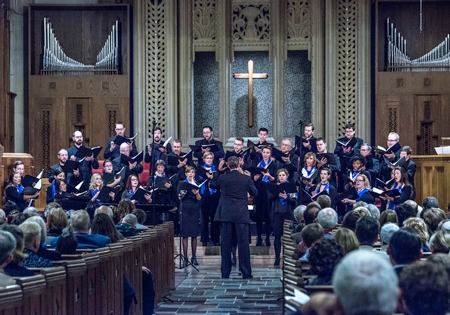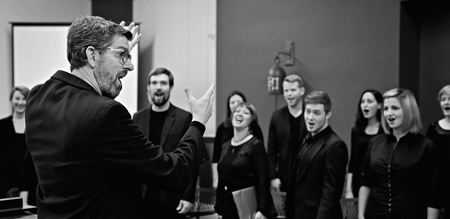by Daniel Hathaway

“In Sweet Music Is Such Art: Celebrating British Choral Music” will take place on Saturday, April 23 at 7:30 pm in the sanctuary of First Baptist Church in Shaker Heights.
“We had performed Cecilia McDowall’s Aurea luce on our first concert in November”, MacPherson said, “so I wrote to her and asked if she had anything along those lines. She told me that her When Time is Broke: three Shakespeare songs had just been premiered by the BBC Singers in January and that the first movement might be just what what I was looking for.”
After listening to McDowall’s new pieces, MacPherson told the composer that he’d love to program the whole set. “She wrote back, saying ‘You do know that April 23 is the 400th anniversary of Shakespeare’s death?’ It also happens to be the 400th anniversary of his birth,” MacPherson said. “He’s one of very few people who were born and died on the same date. It took me about 30 seconds to change the program and do mostly Shakespeare.”
McDowall chose to set lines from Shakespeare’s plays and sonnets that make references to music. “Give me some music” quotes passages from Antony and Cleopatra, Much Ado About Nothing), “Mark how one string” is based on Sonnet VIII and “How sour sweet music is” combines phrases from Richard II, Romeo and Juliet, and Hamlet. The set joins another set of Shakespeare songs by Ralph Vaughan Williams on Saturday’s concert, and readings from the Bard’s works by David Hassler, Director of the Wick Poetry Center at Kent State University, will be interleaved among the choral pieces.
“I sat down with David and we started paging through Shakespeare’s works,” MacPherson said. “The selections don’t necessarily tie things together thematically, but the spoken words pay tribute to his 400th anniversary, and provide moments of thoughtful reflection to the audience — as well as giving the choir a few minutes to rest, which is very practical.”
MacPherson is thrilled to be able to present the U.S. premiere of When Time is Broke, an event that will take place even before Oxford University Press has published the score. “They’re wonderful settings of not-so-familiar Shakespeare texts,” he said. “Her writing is on a par with the settings of English words you find in Benjamin Britten, which is saying a lot.”
Speaking of Britten, Scott MacPherson has stuck to one of his original program choices for Saturday: Britten’s Hymn to St. Cecilia, set to a poem by W.H. Auden. “Britten asked Auden to write the text,” MacPherson said, adding that the composer was constantly reading books of poetry. “He had his head in that stuff all the time, and he always picked quality texts. The Hymn is in the top 5% of all choral pieces that I love and adore, and it establishes a bar that any good choir should achieve. When I realized that I had the voices in Cleveland I needed to perform it, it became the centerpiece of the second program even before the Shakespeare idea rose. I kept it and shaped everything else around it.”
MacPherson noted that the Hymn incorporates traditional references to the patron saint of music, and that Britten himself was born on St. Cecilia’s Day. “Auden explores the whole theme of lost innocence that was also important to the composer, and Britten did an amazing job of setting the text. The poem requires some analysis, but the music is so beautiful in itself that you can enjoy it on its first hearing. On the other hand, this is the 4th or 5th time I’ve performed the work, and each time I find something new in the poetry to bring out.”
MacPherson went on to relate the rather tragic tale of Benjamin Britten’s escape to the U.S. with Peter Pears during World War II. “He was a pacifist and the whole trip across the Atlantic came with dreams of establishing himself as a composer here. It never panned out and he decided to return to England. But when he passed through U.S. Customs, they took one look at his manuscripts of Hymn to St. Cecilia and A Ceremony of Carols, which included the old solfeggio symbols British publishers used to print along with the notes, and determined that they must be some kind of secret code. Customs seized the scores and he had to rewrite both pieces from memory on the ship back to England.”
In addition to the McDowall, Vaughan Williams and Britten works, the Cleveland Chamber Choir will sing Grayston Ives’s The Canticle of Brother Sun, John Tavener’s Song for Athene, Jonathan Dove’s Seek Him That Maketh the Seven Stars, and two songs by Gustav Holst: My Sweetheart’s Like Venus & Swansea. Organist Robert Mollard will be featured in the accompanied pieces.
In an unusual linguistic move, MacPherson decided to sing the first Holst piece in its original language, Welsh. “When the choir first looked at the text, we joked that it looked like Klingon from Star Trek. But I sought the help of Kent State music history professor Jennifer Johnstone, who did her Ph.D. dissertation on the Welsh choral tradition. As it turns out, the language is very lyrical and singable, and has very hard and fast rules for pronunciation. The choir has picked it up very easily.”
Cleveland Chamber Choir performs “In Sweet Music Is Such Art: Celebrating British Choral Music” at First Baptist Church in Shaker Heights on Saturday, April 23 at 7:30 pm. Tickets are $20 general admission, $15 for seniors, $5 for college students, and admission is free for 18 & under.
Published on ClevelandClassical.com April 22, 2016.
Click here for a printable copy of this article



